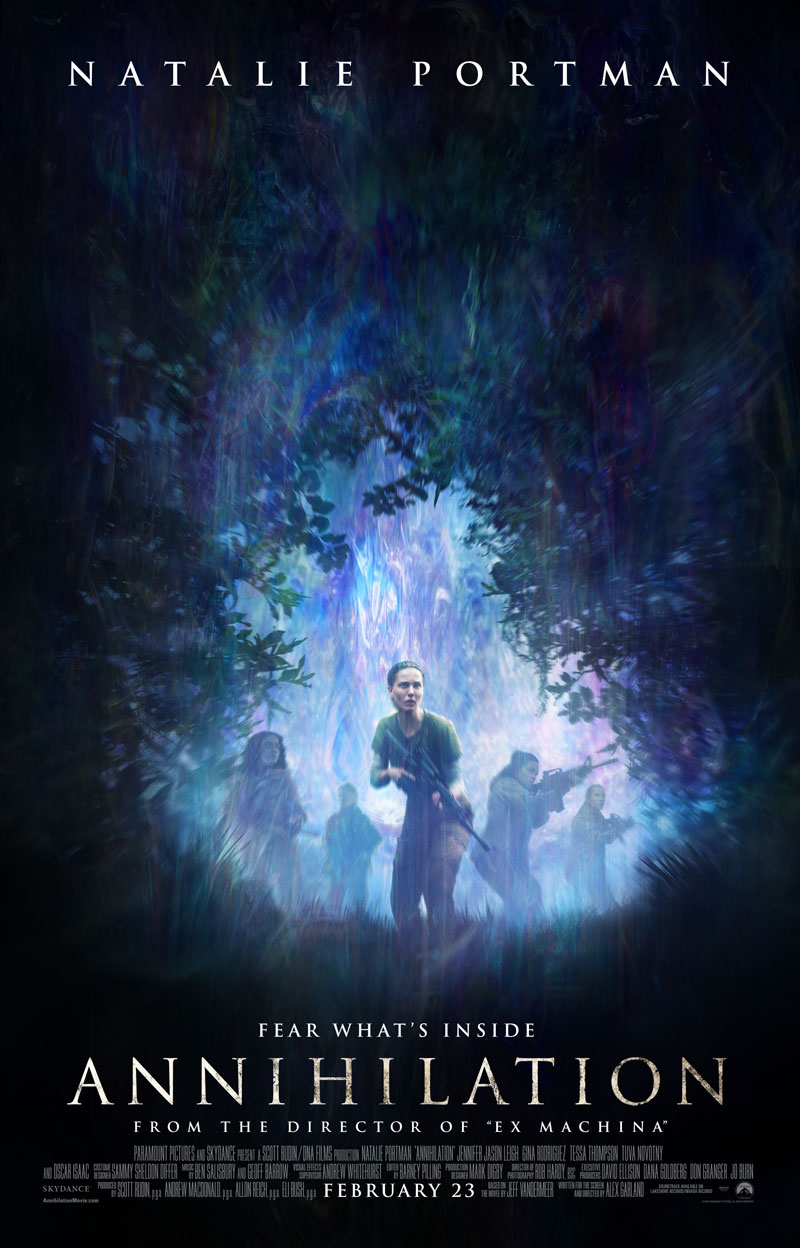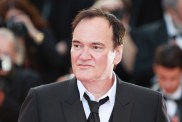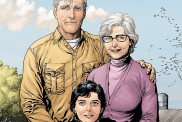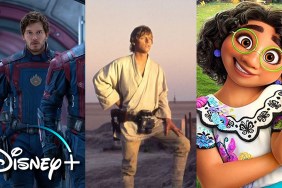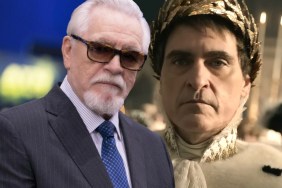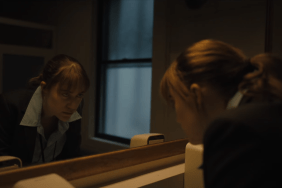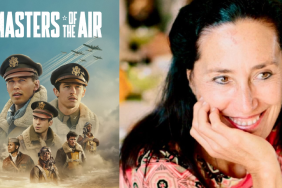The last time, actually the only time, I talked with Ex Machina’s Alex Garland he was carrying a bear head around on a stick. That is not, in context, so strange a thing. Or maybe it is; after entering the world of Annihilation, Garland’s new science fiction mind bender, simple ideas like what is and isn’t strange don’t seem so simple anymore.
RELATED: A Visit to the Set of Alex Garland’s Annihilation
It’s a year since that time and post-production on the film — starring Natalie Portman, Jennifer Jason Leigh and Thor: Ragnarok’s Tessa Thompson — has just about finished turning what was a bunch of strange sets and stranger art department maquettes into a living, breathing world, giving Garland time to reflect on what he and Paramount Pictures are about to unleash on the world. We spoke briefly about that, my time visiting the Annihilation set, jungles, Francis Ford Coppola [I was trying desperately to find some way that made sense to title this “Annihilation Redux,” but it never clicked] and the aforementioned bear head. Check out the interview below and don’t miss the new trailer!
CS: We talked a little about the movie when I visited the set and I wanted to pick up something you said at the time. You mentioned that you had an idea for the story you wanted to tell and the novel was brought to you later and melded well. I was wondering what the story was that you started with when you made this.
Alex Garland: That specific thing was about contact with things that are truly other and alien. It was not alien in a kind of literal sense but alien in a kind of absolute sense, so not something coming from another planet to teach us about a galactic federation or eat you or steal your water or whatever. Something which is alien, alien, like truly other. And that was absolutely contained within the book. I thought the book was really fascinating and there was that weird bit of commonality on that story that was turning around in my mind, so it felt like a perfect fit I guess.
CS: When you have to conceptualize and make concrete something that is totally outside of our experience, how do you go about that? How do you break that down?
Garland: That was something we talked about a lot and tried to figure out. We basically applied a principal that the phrase we attached to it, which we used a lot in pre-production and on set, was ‘suburbia to psychedelia.’ There was a, it’s not like it sounds, there’s a principle behind it, which is if what you’re interested in is strangeness, if you start strange it’s going to be hard to end strange because you get acclimatized to it and it becomes a diminishing return and you have to keep jamming it and jamming it and jamming it and it becomes almost like an action sequence where each action sequence has to top the last. For it to be really strange, this was the theory, we want to start in our world and then end in something much more lyrical and hallucinogenic and instinctual and organic. But without throwing away themes and narrative and truth that relates to the characters.
CS: The comparative, which surprised me, which people kept saying was Apocalypse Now, think of it like that without the war story bits but with the journey through the environment and I guess the detachment.
Garland: Yeah, there’s something to that. I know where that comes from, I can think of various reasons – because maybe the slightly jungle-like setting, but actually Apocalypse Now is a film with a lot of surrealism in and the surrealism ramps up. You begin with an assassination movie and a war movie and it gets progressively more sort of floats into a dream world until by the end you’re floating down a river on dry ice and they’re rolling out heads on sticks and Kurtz and Hopper being off the wall. It’s a fair comparison.

CS: And Coppola famously said about making it, ‘we were in the jungle and… little by little we went mad’ – when you start going out to these far off realms of experience, do you have to go that way or does it help to create these?
Garland: Well I definitely did. [laughs]. There’s no doubt I did and it wasn’t little by little either. It was more like being dropped into a big cauldron of madness. It was pretty f*cking intense. Before we even started shooting. And it didn’t stop being intense until we shut down the edit. It was nuts. And not just me, all of us were put through the ringer by this movie in various ways. Me and the VFX supervisor, Andrew, were just talking a couple of days ago looking back just thinking ‘holy sh*t’ what a weird trip that was. It was a weird f*cking trip, no question.
CS: I have this abiding memory of watching you stalk around the set with a mutated bear head on a stick menacing people with it, so I can only imagine.
Garland: That’s funny. I can tell you the material we got from that, I was very relieved when they were finally able to cut me out of that because it was incredibly disconcerting trying to edit that sequence seeing yourself or your arm and the VFX are a big improvement over whatever I did.
CS: Just from that, and what we saw in the art department, it feels like this film for your second directorial effort is much more ambitious. I mean Ex Machina was a very ambitious film but was also contained with just a couple of characters in a contained location. Here you have the animals, you have the stunts, you have some very psychedelic changes to the environment as the world goes on. Was that intentional — you mentioned it was crazy from the get go — was there a moment you thought ‘maybe I should have tried something else?’ Or was this exactly what you wanted?
Garland: No, not really. It’s definitely not intentional, it’s more just the, you end up reacting against the thing you just did in some ways. There is a big difference between Ex Machina and Annihilation, but there is a big difference between — you may not have seen these films — Ex Machina and Never Let Me Go or Dredd. They were sort of wildly different and the ambition in terms of, I don’t know, budget or number of locations, all of that to me is sort of arbitrary. They’re more sort of arbitrary, they’re consequences of the story and the themes, but it all starts with a script. You’re not really thinking about locations or budget, you’re thinking what is the story, what are the themes, who are the characters, what are they doing, why are they doing it? It’s almost a surprise later when you think ‘sh*t, now we’ve got to pull off this thing, we need a swamp, an alligator, a mutant bear, five people and getting coverage of five people and we’ve got to get out of this scene in the next three hours…’ It didn’t, all of that is sort of an accident, a consequence, you just deal with it as it comes. There’s nothing strategic about it.
CS: That park really did look like Louisiana, you pulled that off.
Garland: Good production designers.
CS: Yeah. You talked a bit about this idea of ‘the other,’ but a good bit of this was the changing of the environment, it’s mutating and how it’s affecting nature. Was that something else you wanted to do or did it come with the book?
Garland: I think it’s embedded in the thing; it’s in its bones. We, broadly speaking, shot in sequence. One of the things that happens is that people get more and more, I guess crazy in a way, more and more exhausted and deeper and deeper in their own headspaces. This is across the board, this is everyone, but also more and more bonded and more and more proficient. Just the act of shooting a film takes you on that journey and the fact that the sets and locations added to that. It was like chucking fuel on the fire. Certainly making the film was like being in the film, from my point of view they were almost indistinguishable.

CS: You can’t expect a movie to comment on things that are going to happen in the future after the making of has happened, but things happening now with the weather season we’ve had and with talks about the climate agreements and lots of concerns about how we’re going to interact with our environment in the future and how that’s going to affect us as a species, it felt like some of that — in a very extreme way — was reflected in what you were shooting. I didn’t know if that was something you had in mind or…
Garland: It actually wasn’t. I can tell you the book was more concerned with environmentalism than the film is. The film is much more concerned with the internal collapse of these people as anything happening to the planet, I would say.
CS: I didn’t want to bring Ex Machina into it too much, I like to keep each thing of itself, but one thing you said at the start was investigating this idea of the other, this alien intelligence, something unlike us …
Garland: Or not intelligence, by the way.
CS: Or not intelligence.
Garland: In a way that’s exactly the kind of thing we’d automatically fall into, is ascribing human-like things to something else. Motivation, language, intelligence, whatever it is, but this is more alien than that I would say. But sorry to interrupt.
CS: No, no, that’s exactly what… my sense from Ex Machina that’s what that was, we’re looking at an alien intelligence, one that we’ve created quote-unquote ‘in our image,’ and we’re ascribing things to it that it may or may not have…
Garland: Absolutely, yeah.
CS: … and this seems very much following that train of thought to its next even further-out arena.
Garland: Kind of, although this is almost like more like the product of having the intelligence. The product of what it is, then have that thing, of a consciousness and an emotional life and relationships and to live in this strange world, this weird subjective world and how we react to it. Like, how we react to the difficulties of strangeness, in a weird way it’s a quite interesting point, it would be more like a sequel in that respect, sort of following on… the film is most concerned with people’s interior state, I would say.
CS: The first book is one a trilogy that I think he’s still finishing. Do you have any plans to make films out of the rest of them?
Garland: I’ve got zero plans, I never did. At the point I wrote the script, and we were way into the process of starting to make the movie, Jeff was still writing books two and three. I read book one in Galley form — it hadn’t been published yet — and so I did not think about those other two books and also I don’t mind the idea of other people working on franchises, I’ve got no judgment about it, its fine, but it’s not something I want to do. What we were talking about in terms Ex Machina to Annihilation or Never Let Me Go to Dredd or 28 Days Later to Sunshine or whatever it happens to be, I actively do not want to be in the same world I just spent three years in, I actively want to do something else, so the whole idea of sequels is not one that appeals to me in the slightest. I never had any desire to — that’s no disrespect to anyone who does want to do that or Jeff’s trilogy or anything — I’m just talking from a personal point of view, that’s not my scene.
CS: That makes sense. Thanks very much for your time.
Garland: Thank you.
Annihilation opens in theaters on February 23, 2018.
(Photo Credit: Getty Images)
Annihilation
-
ANNIHILATION

Left to right: Natalie Portman and Oscar Isaac in ANNIHILATION, from Paramount Pictures and Skydance. -
ANNIHILATION

Alex Garland and Jeff VanderMeer on the set of Annihilation from Paramount Pictures and Skydance. -
ANNIHILATION

Gina Rodriguez, Natalie Portman, Tessa Thompson and Tuva Novotny in Annihilation from Paramount Pictures and Skydance. -
ANNIHILATION

DIrector Alex Garland and Natalie Portman on the set of Annihilation from Paramount Pictures and Skydance. -
ANNIHILATION

Tess Thompson and Gina Rodriguez in Annihilation from Paramount Pictures and Skydance. -
ANNIHILATION

Gina Rodriguez in Annihilation from Paramount Pictures and Skydance. -
ANNIHILATION

Natalie Portman and Gina Rodriguez in Annihilation from Paramount Pictures and Skydance. -
ANNIHILATION

Natalie Portman in Annihilation from Paramount Pictures and Skydance. -
ANNIHILATION
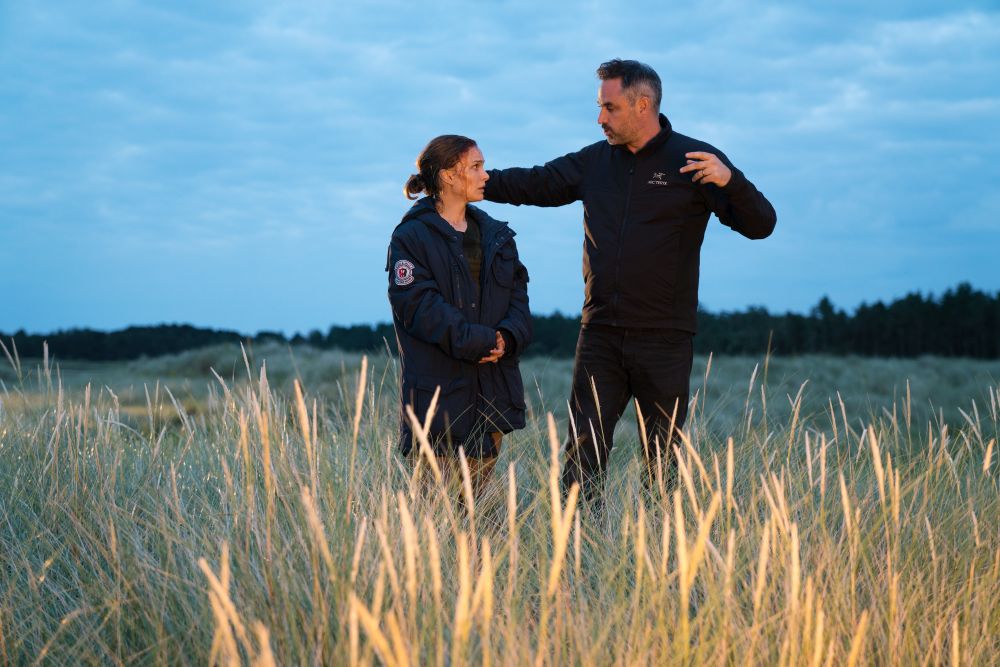
Natalie Portman and Director Alex Garland on the set of Annihilation from Paramount Pictures and Skydance. -
ANNIHILATION

Jennifer Jason Leigh plays Dr. Ventress in Annihilation from Paramount Pictures and Skydance. -
ANNIHILATION

Tuva Novotny plays Cass Sheppard, Gina Rodriguez plays Anya Thorensen, Tessa Thompson plays Josie Radek and Natalie Portman plays Lena in Annihilation from Paramount Pictures and Skydance. -
ANNIHILATION

Oscar Isaac in Annihilation from Paramount Pictures and Skydance. -
ANNIHILATION

Natalie Portman plays Lena and Tuva Novotny plays Cass Sheppard in Annihilation from Paramount Pictures and Skydance. -
ANNIHILATION

Natalie Portman plays Lena in Annihilation from Paramount Pictures and Skydance. -
ANNIHILATION

Tessa Thompson plays Josie Radek in Annihilation from Paramount Pictures and Skydance. -
ANNIHILATION

Jennifer Jason Leigh and Natalie Portman in Annihilation from Paramount Pictures and Skydance. -
Annihilation

-
Annihilation

-
Annihilation

-
Annihilation

-
Annihilation

-
Annihilation
